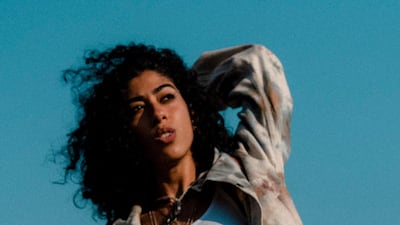In 2015, a group of Egyptian teenagers created a WhatsApp group they called El Regala, or the men. Among the content they shared on it were photos of their female classmates, one of whom was Sara Elmessiry in a bikini.
Three years later, Elmessiry became a rapper and detailed this experience in a song called The Rain, calling out the boys by name.
The track was released in 2018 when Elmessiry, known by her stage name Felukah, was finding her rhythm in the hip-hop scene while studying in New York. She was invited back to her high school in Cairo to perform, and she shocked the faculty and the students when her song of choice was The Rain.
"I was just scratching the surface," she tells The National. "There is so much more we need to talk about. That is what it comes down to. It's a need. I feel like I'm creating out of a need. I need to hear someone rapping about my spaces and my streets."
Elmessiry has been creating ever since her first single came out. Last month, she released her second album, Dream 23, a collection of 12 tracks. The record, the rapper says, is about turning 23 next year and taking the listener through her vision for the future.
"I'm a big believer in manifestation and the realm that goes beyond what we see and I think, with that album, I really wanted to tap in and just show people what it is when I close my eyes and see that realm," she says.
Elmessiry has been dreaming big since she was a child. She grew up in Cairo's leafy suburb of Maadi. Its location by the Nile inspired her stage name Felukah – feluccas are leisure boats that blare music from giant speakers as they carry tourists along the river.
Her first music video was filmed in Maadi. She is seen dancing on the streets of Cairo and New York as she raps about the struggles of Egyptian women in a patriarchal society.
Elmessiry continued to ride her own feminist wave when she teamed up with Musawah, an international initiative led by feminists that promotes justice and equality for Muslims. She wrote her song Mesh Hastanna (I Won't Wait) for a summer campaign to promote women's rights.
"I was never scared of the word feminism, no matter how polluted that word has become," she says. "Just its existence makes way for women to finally be part of the dialogue. Women taking the torch and leading the way. Women being part of making culture. That is what I ultimately wanted to be."
Elmessiry does receive some negative comments, mostly from men in Egypt – an interview she did with Scene Noise, an Egyptian platform that highlights up-and-coming Arab artists attracted a string of negative comments about her musical abilities and style. "I know a lot of people will not understand what I'm doing because I'm pushing the boundaries … people abroad always respected what I do," she says.

But she is not fazed. “This is not representative of the Egypt I come from. Instead of condemning Egypt I have to separate between the bored people online and the people of my country.”
Dance and poetry were her early tools, and she auditioned for almost every talent show in middle and high school. She later moved to the US to pursue her passion for poetry, studying creative writing at Hunter College. Now 22, she has published three poetry collections.
"The speed that came with moving to New York and being around people, working a hospitality job, babysitting, going to school in Midtown – your pace in life just goes up by a hundred when you live there," she says.
Elmessiry began to hone her talent, marrying the culture of her native Egypt with New York’s quick rhythm.
Currently in quarantine at her apartment in the city, she continues to blend her culture and Egyptian upbringing with her music and lyrics. The duality of her identity is grounded in her music as she seamlessly weaves her mother tongue, Arabic, into her English rhymes.
"I have hit the sweet spot," she says of this synchronicity. "This, for me, is freedom. The last thing I want to be is a product of a label, management or what the world wants to see. I think the most important thing here is that I don't identify myself as American at all. I'm 100 per cent Egyptian to my core."
But that comes with its challenges, she says.
“It’s always a struggle to try and stay respectful and relatable to my Egyptian following, but still push that envelope at the same time. You don’t want to step on toes, you just want to dance over them a little bit.
“I have always put into consideration how I present myself visually and what I’m gonna say and what I’m gonna speak on.”
When the rapper was filming her latest music video, Lookin' at Me, which came out last month, with western producers and designers, she had to stop some processes. "When they wanted me in a deep-cut shirt and lying on the same bed with my partner. I was like: 'No, Baba's just not gonna like this'."
But her decisions go beyond respect for her culture. She wants to retain a familiarity with her Arab and Egyptian audiences, one that could open doors for Middle Eastern women to some day say: "That could be me."

